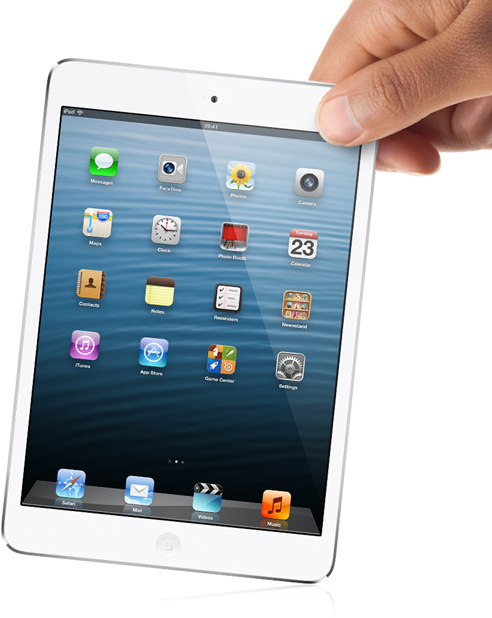

Apple iPad use online dropped by 7.1 percent in December as consumers fired up the various new mobile and electronic devices they received over the holidays, which ultimately boosted the usage numbers for competing Amazon and Android devices.
Those are the results from a new report on consumer mobile device online usage from research firm Chitika, which sampled hundreds of millions of smartphone and tablet page-view impressions from the Chitika Ad network to compile usage numbers for December 2012.
The study looked at usage only in the United States and Canada from 1 December to 27 December for tablets and for smartphones.
The iPad usage drop, from 86 percent of users in the study down to 78.9 percent of users, showed that consumers moved their online usage to other devices, which saw higher usage, including Amazon’s Kindle Fire tablets and Samsung’s Galaxy tablets, according to Chitika.
Google’s Nexus tablets had a 2 percent usage rate, more than doubling from .9 percent in December, while Microsoft’s Surface tablets had a .4 percent usage rate increase, more than doubling from .17 percent during the period.
Research In Motion’s BlackBerry Playbook had a .7 percent usage rate, down .02 percent from before the holidays.
“Holiday buying brought in new devices, so people are using new things to go online,” Gabe Donnini, an analyst with Chitika, told eWEEK. “The iPad has been the undisputed leader of the tablet market since 2010, but as the market matures, with the availability of new devices at different price points, that could explain the drop in the iPad’s usage.”
Chitika studies web usage numbers because the figures “give you direct insights into the accessibility and usability of different devices and platforms”, said Donnini. “These large shifts in web usage among the major tablets can potentially be influenced by the fact that it’s the fourth financial quarter and that a lot of new devices are getting into the hands of consumers.”
And while the December trend is interesting, it’s likely that it’s just a short-term trend inspired by the holidays and the gift-buying season, he said.
“While short-term trends can be indicative, it’s always better to look at the long-term trends to get a better feel of the big picture,” said Donnini. “In the longer term, you can look for usage levels to buoy back to pre-holiday levels,” where the iPad will regain some of the usage share it lost in December. “It may not return fully, but there will be some movement in the other direction.”
Chitika said it expects that the iPad’s share of tablet traffic will return to the 80 percent range – though admittedly lower than preholiday levels – as users return from vacation and browse with their new devices less frequently.
Overall, it appears that the tablet marketplace is following the pattern of the smartphone market after the launch of Apple’s iPhone back in 2007, said Donnini.
“In 2010, the iPhone was still the dominant smartphone platform by a wide margin, but by 2012, Android was exceeding the iPhone in terms of global smartphone sales, diversification, cheaper price points and with a wide variety of devices that were available, with some which exceeded the iPhone’s features,” he said. “We should really be looking at the tablet market under the same lens. We should be looking at this same trend to be emerging in the tablet market over the next two to three years.”
The quick rise of Google’s Android mobile operating system is changing consumers’ mobile usage patterns, he said: “Based on the data observed in our study, Android has emerged as the operating system of choice for consumers for the 2012 holiday season.”
In the smartphone segment, Apple’s iPhone 5 and Samsung’s Galaxy S III scored the largest web usage gains in December, posting 1.1 percent and 1.0 percent gains, respectively, according to Chitika.
The iPhone 5 usage share for the period hit 8.3 percent, while Samsung Galaxy S III usage hit 4.3 percent. Samsung’s large-screen smartphone, its 5.5-inch Galaxy Note II, saw a .17 percent usage share increase and now stands at 1 percent. Competitor HTC saw no share changes for its 5-inch Droid DNA, which stands at a .01 percent usage rate.
Do you know all about UK tech leader ARM Holdings? Take our quiz!
Originally published on eWeek.
American space agency prepares for testing of Boeing's Starliner, to ensure it has two space…
As UK and Europe develop closer military ties, European Commission says it will invest €1.3…
Zuckerberg seeks to revive Facebook's original spirit, as Meta launches Facebook Friends tab, so users…
Notable development for Meta, after appeal against 2021 WhatsApp privacy fine is backed by advisor…
First sign of shake-up under new CEO Lip-Bu Tan? Three Intel board members confirm they…
Trump's nominee for SEC Chairman, Paul Atkins, has pledged a “rational, coherent, and principled approach”…